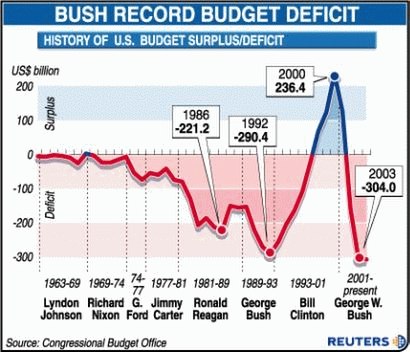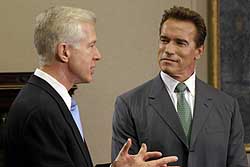 On 8/2/04 I sent the following letter to the LA Times. It was a reaction to Gov. Arnold Schwarnegger's budget deal, which "solved" the fiscal crisis by putting California further into debt:
On 8/2/04 I sent the following letter to the LA Times. It was a reaction to Gov. Arnold Schwarnegger's budget deal, which "solved" the fiscal crisis by putting California further into debt: On 8/2/04 I sent the following letter to the LA Times. It was a reaction to Gov. Arnold Schwarnegger's budget deal, which "solved" the fiscal crisis by putting California further into debt:
On 8/2/04 I sent the following letter to the LA Times. It was a reaction to Gov. Arnold Schwarnegger's budget deal, which "solved" the fiscal crisis by putting California further into debt:
Arnold Schwarzenegger would rather pass our problems to a future generation than solve them himself. Evidently he's too afraid to do what other governors have done to balance their budgets: raise taxes. I can only conclude we have a "girlie man" for our governor.
A friend forwarded this letter to someone named Jack, who responded:
I bet Mr. Schmidt is a Democrat, That is the Democratic solution to everything, "raise the taxes."
I would like just once, for one of these people to tell me when a state or a country EVER taxed itself into prosperity. What is going to happen when the tax rate is 100%, what then? I guess money won't be needed anymore, the government will provide everything. How is the government going to get people to get up and go to work for free?
Less taxes, less Government, less freebies, less entitlements (whatever the hell that is) I guess I am the American that Michael Moore has nightmares about, I want nothing from the government except to be left alone.
Jack
If I was a believer I would say God help our country and our way of life.
Rob's reply
On 5/17/05 I responded as follows:
>> That is the Democratic solution to everything, "raise the taxes." <<
No, that's a Republican's simplistic and frankly stupid misunderstanding of what Democrats stand for.
>> I would like just once, for one of these people to tell me when a state or a country EVER taxed itself into prosperity. <<
1993, when Clinton's tax hikes preceded an unprecedented economic boom. See Democrats Are Better Money Managers for details.
>> What is going to happen when the tax rate is 100%, what then? <<
Why waste time with this ridiculous hypothetical case? The top tax rate has decreased from 70% to 28%, and none one is talking about raising it significantly. Can you say "red herring"?
Regardless of what the tax rates are, the real issue is whether the country is prosperous. The evidence is clear. The US economy prospers more under Democrats than under Republicans.
>> I guess money won't be needed anymore, the government will provide everything. <<
I guess you haven't a clue how economics or politics work.
>> How is the government going to get people to get up and go to work for free? <<
Nonsense piled upon nonsense. Let me know when you want to debate reality, not your fantasies.
>> Less taxes, less Government, less freebies, less entitlements (whatever the hell that is) <<
Tell it to George W. Bush or Ronald Reagan. Both of them expanded the government and put the country further into debt. Meanwhile, Democrat Bill Clinton presided over the greatest economic boom in US history. Democrats know how to create prosperity, while Republicans don't know jack, Jack.
>> I guess I am the American that Michael Moore has nightmares about <<
Yes. I believe the category is called "stupid white men." We all fear ignoramuses like Dubya, who has sent 1,600 Americans to their deaths on a false pretext.
>> I want nothing from the government except to be left alone. <<
Great. Then don't drive on a publicly funded road. Don't call the police if something goes wrong. And don't take a mortgage deduction on your income taxes. Otherwise, you're a hypocrite.

>> If I was a believer I would say God help our country and our way of life. <<
I would too. Bush is arguably the worse president in history. He's destroying jobs, the environment, and the chances for world peace. That's an "impressive" record even for a stupid white man like him.
Rob Schmidt
More facts for Jack
Jack needs to educate himself on which party spends the most. I guess he doesn't know that historically, Democrats are the party of fiscal responsibility. And that President Clinton launched his economic boom by raising the top tax rates. (See Democrats Are Better Money Managers for the details.)
Jack is apparently unaware of these facts. I bet he's a Republican.
The fact is that every state except California has made tough choices to balance its budget. Every state, including those with Republican governors and legislatures, has raised taxes if necessary. Schwarzenegger is alone in being fiscally irresponsible, and he's a liar to boot. He promised he'd tear up the state's credit cards and now he's maxing them out.
Only a right-wing fanatic would make this into a partisan issue. Again, other Republicans have done the deed, so it's not a Democratic failing. President George H.W. Bush and California Gov. Pete Wilson are just two of the well-known Republican tax-raisers.
Today Schwarzenegger stands alone in his fear of raising taxes. If Jack is afraid to call a liar a liar and a coward a coward...well, I'm not. Perhaps Jack is a girlie man too.
Here are the details on Arnold the girlie man for Jack's edification. I suggest he educate himself in the future so I don't have to.
From the LA Times, 8/1/04:
THE STATE
State Pushes Problems Into Future
* Across the nation, lawmakers raise taxes or cut programs to resolve budget shortfalls. But in California, big-time borrowing is the answer.
By Evan Halper, Times Staff Writer
SACRAMENTO The tobacco state of Virginia is raising cigarette taxes tenfold. Illinois will make do with a workforce smaller than it had in 1983. And New Jersey will force its millionaires to share more of their wealth with the state.
Virtually every state facing a major budget shortfall this year has made painful policy choices. Except California.
A year ago, amid the lingering effects of economic recession, state governments across the country were coping with deficits, shortfalls and financial angst of all kinds. But now, as other states are making their way back into the black, California continues to push its problems into the future with borrowing.
Corina Eckl, a state budget expert for the National Conference of State Legislatures, said no other state budget relied on as much borrowing as California's.
"When you look at the numbers, California stands alone. We are not seeing widespread pushing forward of budget problems," she said. "Most states are trying to resolve them in their entirety in fiscal 2005."

The $105.4-billion spending plan signed into law Saturday by Gov. Arnold Schwarzenegger includes a budget shortfall now expected to total as much as $17 billion over the next two years.
Even though the governor hopes to enact a sweeping reorganization of state government in the coming year that could save billions, the state's lingering debt looms like a long hangover, with today's spending causing pain years into the future.
The reason is simple: The state is making few sweeping spending reductions to keep the bills from piling up. And there is no plan to bring in more tax money to pay them in full. So California continues its credit card binge.
"Other states are going to be laughing at us for the way we have handled things," said Michael Bazdarich, a senior economist with the UCLA Anderson Forecast. "It's worrisome."
The budget Schwarzenegger signed is balanced with at least $15.6 billion of borrowing. The biggest chunk of that is $11.2 billion from the deficit bond package voters approved in March. The rest will come in several billion dollars of IOUs to various programs and a $920-million loan to make the payment into the pension fund for state workers.
"By 2006, this state is going to be in a deep, deep hurt unless this state has a tremendous recovery," said state Sen. Bruce McPherson (R-Santa Cruz).
The situation has also prompted continuing concern on Wall Street.
John Hallacy, managing director of municipal research at Merrill Lynch, said he was still waiting to see the governor summon lawmakers into the small smoking tent outside his office to extract far-reaching budget reforms. "We haven't seen anything come out of that tent yet other than smoke," he said.
An Assembly Republican staff analysis of the budget underlined that point: "This budget," it says, "contains none of the major reforms sought by the administration this year."
Some Democrats feel the same way. "This is a budget that turns today's problems into tomorrow's problems and compounds them with interest," said state Sen. Debra Bowen (D-Marina del Rey).
But Schwarzenegger said he had a solution in the works.
On Tuesday, his administration will formally unveil a controversial proposal for a top-to-bottom reorganization of government that projects savings of tens of billions of dollars by 2010. But opposition to the plan is already beginning to form among a number of powerful interest groups, including public employee unions and the environmental lobby.
The governor's task force estimates that it has found ways to save $32 billion over five years. But many of the proposals have been rejected in the past and most of the projected savings would not be expected to materialize for some time. The task force projects that if all recommendations are adopted, only $6 billion will be realized by June 2006.
Critics of the proposal charge that it was put together in a secret process that included significant input from business groups while largely locking out activists for other interests.
The administration abandoned far less ambitious reforms in the draft budget it presented in January after running into intense political opposition.
Even so, administration officials say they are confident that an improving economy, together with projected savings from the overhaul and other reforms, will end projections of never-ending budget shortfalls.
"Those projections aren't going to happen," said Department of Finance Director Donna Arduin. "They assume the budget doesn't get balanced next year."
At this point, however, few in the Capitol are confident that the administration's reorganization plan called the California Performance Review will lead to the kind of savings its organizers are talking about.
Senate President Pro Tem John Burton (D-San Francisco) said most of the plan stood little chance of ever being enacted.
Regardless of the recommended overhaul, budget troubles loom. And closing the gap for good would require some bold policy decisions. Every year the state puts off dealing with it makes it harder. There are fewer one-time cuts and other fiscal Band-Aids available to make it into the next year.

Other states have been faster to respond. Across the country, many governors and lawmakers began two years ago to build bipartisan support for politically unpopular policy decisions needed to at least begin balancing the books.
In New York, Republicans last year defied their own party's governor to join with Democrats in overriding his veto of $2.5 billion in sales and income taxes. Ohio's GOP-dominated Legislature joined with a Republican governor to approve $3 billion worth of tax increases over two years. New Jersey raised taxes on the wealthy and put new surcharges on tires and plastic surgery.
Arduin, the California finance director, is critical of those tax increases. The strategy will only backfire for those states by worsening the business climate, she said. "It's good for us," she said, "because it will send more jobs this way."
But experts say the alternative is to cut spending a technique also used nationally but avoided in Sacramento.
Michigan is dropping 45,000 Medicaid recipients from the rolls. Mississippi, a state that already had extremely limited health insurance for the poor, blocked more people from the program to bring its budget into balance. Florida, where Arduin oversaw the budget before coming to California in October, long ago began reining in a number of government services.
Illinois enacted an early retirement program intended to reduce the size of its state workforce to a level lower than it was 20 years ago.
Brad Williams, an economist with California's nonpartisan legislative analyst's office, said such reductions have gone a long way in helping other states close their budget gaps. "We are pretty far behind," he said of California's ongoing budget imbalance. "This problem is something we have in front of us that others don't."
During California's last budget crisis, in the early 1990s, the state responded much more quickly, raising taxes and cutting programs.
"Here, there is less of all that," Williams said. "There is just a much, much greater desire to preserve what we have at the cost of the future . We would say it is better to make those hard decisions now."
The budget signed Saturday does bring spending down by making cuts to local government, public universities and schools. But most of those reductions are short-term and will face state officials again in 2006. They came with guarantees from the governor that spending in those places which account for more than half the state's general fund will go back up significantly in two years. They are guarantees that Schwarzenegger and lawmakers may be unable to back away from.
"The political pressure is going to be intense to spring back and provide the money that was cut," said David Hitchcock, a director of public finance ratings at Standard & Poor's in New York. "Schools and local governments are planning and budgeting on the assumption that if they just get through the next couple of years, the money will be there."
With schools and local government protected from cuts in fiscal 2006-07, the only major area left to cut would be healthcare and social services. Cutting a few billion dollars in that area could eviscerate a number of programs. The budget hole for fiscal 2006-07 is projected to be much larger than a few billion dollars.
Economists much like Democrats and Republicans disagree on whether the state needs more taxes or less spending. But they agree that letting the problem fester will come back to haunt taxpayers.
Bazdarich of the UCLA Anderson Forecast said a tax increase was the last thing California needed to get its economy on track. But he said four years of budget neglect had made it extremely likely. "The longer this thing goes on, the more likely they are to solve it with a tax increase," he said. "Businesses are already feeling beat up in this state. The next round of tax hikes will hurt the economy."
The budget hangover presents more problems. As other states once again begin investing in new transportation projects, education initiatives and programs to attract business, California will be struggling to just get into the next year.
"If we want to attract the next biotech revolution, we have to offer workers a nice place to live with schools they will want to send their kids to and transportation and airport systems that work," said Stephen Levy, director of the Center for the Continuing Study of the California Economy, in Palo Alto.

"A state that is paralyzed at how to find the money to do these things is probably sending the wrong signal," he said. "We don't have any room to fall further behind."
More on Arnold's approach to economics
From the LA Times, 10/24/04:
COVER STORY
Downsizing Arnold
Nearly one year into its run, the Schwarzenegger show in Sacramento has been highly entertaining, but the promised revolution has yet to materialize.
By Robert Salladay and Peter Nicholas, Times staff writers
Robert Salladay and Peter Nicholas cover the Schwarzenegger administration in Sacramento.
For all his language about delivering an on-time budget, Schwarzenegger needed one day more to reach a compromise than Davis did the year before. Though Schwarzenegger insists that the state now is living within its means, the methods used to complete the budget smack of the Davis years. Heavy borrowing. Accounting finesse. Onetime fixes.
Stephen Moore, president of the Washington, D.C.-based Club for Growth, an anti-tax group, and an outside advisor who reviewed the administration's early audit of state finances, described the budget as part "smoke and mirrors." Schwarzenegger met his promise not to raise taxes, after voters authorized up to $15 billion in borrowing-more than he needed. About $3 billion from the bond issue is still available for him to spend. But the state's debt is mounting. According to the independent legislative analyst's office, the amount of debt backed by the state general fund will rise from $33 billion in May to nearly $51 billion by next June-a 54% increase.
"We're not only spending more than we can afford, and borrowing a great deal more than we can afford, but we're also obligating ourselves to huge balloon payments a few years down the road," says state Sen. Tom McClintock (R-Thousand Oaks), who ran against Schwarzenegger in the recall and is considering a bid for lieutenant governor. "The fundamental financial problems of the state of California have not yet been addressed."
So maybe the budget revolution comes next year. Then again, Schwarzenegger's options remain mostly bad. He can break a campaign promise and raise taxes, cut spending so deeply that he shreds the social safety net-or both. Another round of heavy borrowing is unthinkable. Some in the administration are not ruling out a tax increase, while others hope a growing tax base will solve the problem. "We're betting on a strong economy," says Patricia Clarey, the governor's chief of staff.
Says Moore: "There's this one lingering problem that he's going to have to solve soon: What are we going to do with all this debt? It's enormous . He's pushed a lot of these problems into fiscal [year] 2006. How is he going to deal with that issue? Because you can't keep pushing these projects into future years."
"Betting on a strong economy"...in other words, Schwarzenegger has no plan. Why did we recall Gray Davis if Arnold was going to sit on his butt and pray for a miracle? We could've elected a chimp if we needed someone to "bet" on a strong economy for us.
More evidence that Arnold is a poser
MICHAEL HILTZIK / GOLDEN STATE
He's a Lot Weaker Than He Looks
April 25, 2005
In recent weeks the signs have mounted that we are witnessing the twilight of the Schwarzenegger administration.
One by one, the governor's grand initiatives have come apart. The box-exploding state reorganization? Abandoned. The balanced state budget? A non-starter. Government without special interests? A joke. Bipartisanship in Sacramento? Never happened.
Of his four-part 2005 reform initiative redistricting reform, teacher pay reform, pension reform, fiscal reform barely anything survives to place on the November ballot. This is probably not a bad thing, because like virtually every other policy initiative Schwarzenegger has proposed since his election, these reforms generally have been carelessly conceived and half-baked in execution.
The so-called Live Within Our Means Act, for example, has all the hallmarks we have come to expect from this administration. It purports to address a serious issue, namely the state's inability to enact a balanced budget. While claiming to provide a moderate solution, it advances the narrow interests of lobbyists, in this case Allan Zaremberg of the California Chamber of Commerce and William Hauck of the California Business Roundtable, the measure's authors.

Its provisions are so sloppily contrived that they would exacerbate the problems it claims to alleviate. While the administration rails about how much of the state budget is subject to automatic formulas, the act would place even more spending on autopilot. It would conflict with other state laws, including spending initiatives passed by the voters, raising the prospect of endless confusion and litigation during budget seasons for years to come.
Most characteristically, it's designed as a ballot initiative. This is Schwarzenegger's preferred method of governance, because it doesn't require subjecting a proposal to the battle-testing of the legislative process or to public debate. It only requires the spending of money which the chamber and Roundtable can provide in abundance and the presentation on television of Schwarzenegger's electric grin.
The governor's predilection for such remote-control governing is understandable. For all that he claims to absolutely love his job, he has never demonstrated a true enjoyment of politics as it's normally understood or for that matter, much aptitude for it. He doesn't project any of the qualities we see in born politicians whatever their ideological stripe, such as Bill Clinton's empathy for ordinary citizens, Lyndon Johnson's relish for horse-trading or Richard Nixon's intellectual fascination with the political process.
All that Schwarzenegger seems to enjoy is the opportunity to surround himself with attention and pomp the trappings of political power, the appearances before huge crowds, the slavish interviews by Oprah and Katie. He's like one of those admirals in Gilbert and Sullivan, who adorn themselves in elaborate uniforms dripping with medals but don't know the first thing about going to sea. (And don't want to know.)
Everything else about governing seems to leave him bored. Perhaps the passage of his budget bonds and a workers' compensation reform early in his term convinced him that the game is easy. But the bonds didn't solve anything about the state budget, the workers' comp reform is a work in progress, and he's achieved nothing of note since then. His lack of understanding that politics is the art of building consensus and reaching compromise over the long term explains why he retreats into name-calling and petulant sulking when he doesn't get his way, a personality trait that never has been even remotely charming and has now become tiresome and self-destructive.
It's also becoming clear why he has never articulated a coherent philosophy of government he doesn't have one. When George Stephanopoulos of ABC News flew to California earlier this year to delve into the governor's political principles, he was so nonplused at Schwarzenegger's expressions of complete indifference to major national issues Social Security, immigration, judicial appointments that he was reduced to soliciting the governor's Oscar picks. This is one of the three men "shaping the future of the Republican Party," as his wife, Maria Shriver, told Vanity Fair? (The others she mentioned are Rudolph Giuliani and John McCain.)
Shriver's understandably fulsome judgment still gets echoed by the stars of the national press. Back in February, for example, the columnist George Will proclaimed Schwarzenegger a political Merlin poised to become one of the state's "most transformative governors." He further predicted that the ripples from Schwarzenegger's revolutionary political program would soon "roll eastward across the country."
Within a month of Will's panegyric, the governor's ballot initiatives started blowing fuses. Will thus found himself in the same position as almost everyone else who has taken Gov. Schwarzenegger at his word, including educators, local government officials and the Democratic officeholders who went along with him for the first year: hung from a limb.
Schwarzenegger's program is a shambles, his popularity is deteriorating, and he seems to be spending less time in the public eye. The state is deeper in debt than ever. The schools and the roads are crumbling at a faster pace. Far from being one of California's "most transformative governors," he's well on his way to ending the term with scarcely any accomplishments at all.
No wonder that his wife recently appeared on "Oprah" to telegraph his reluctance to run for a second term. In the next gubernatorial term, all the problems that Schwarzenegger has failed to address in this one will come home to roost. He'd be insane to run again, and we'd be insane to reelect him: A Gov. Schwarzenegger even more bored and nettled by the mundane tasks of governing California than the one we currently have in office is a truly scary prospect.
In short, Schwarzenegger is a political coward...a sissy...a girlie man, as I stated originally. QED.
Related links
Are taxes "theft"?
The myth of American self-reliance
Schwarzenegger ad: Gaming tribes should pay "fair share"
America's culture wars (economic)
|
. . . |

|
All material © copyright its original owners, except where noted.
Original text and pictures © copyright 2007 by Robert Schmidt.
Copyrighted material is posted under the Fair Use provision of the Copyright Act,
which allows copying for nonprofit educational uses including criticism and commentary.
Comments sent to the publisher become the property of Blue Corn Comics
and may be used in other postings without permission.